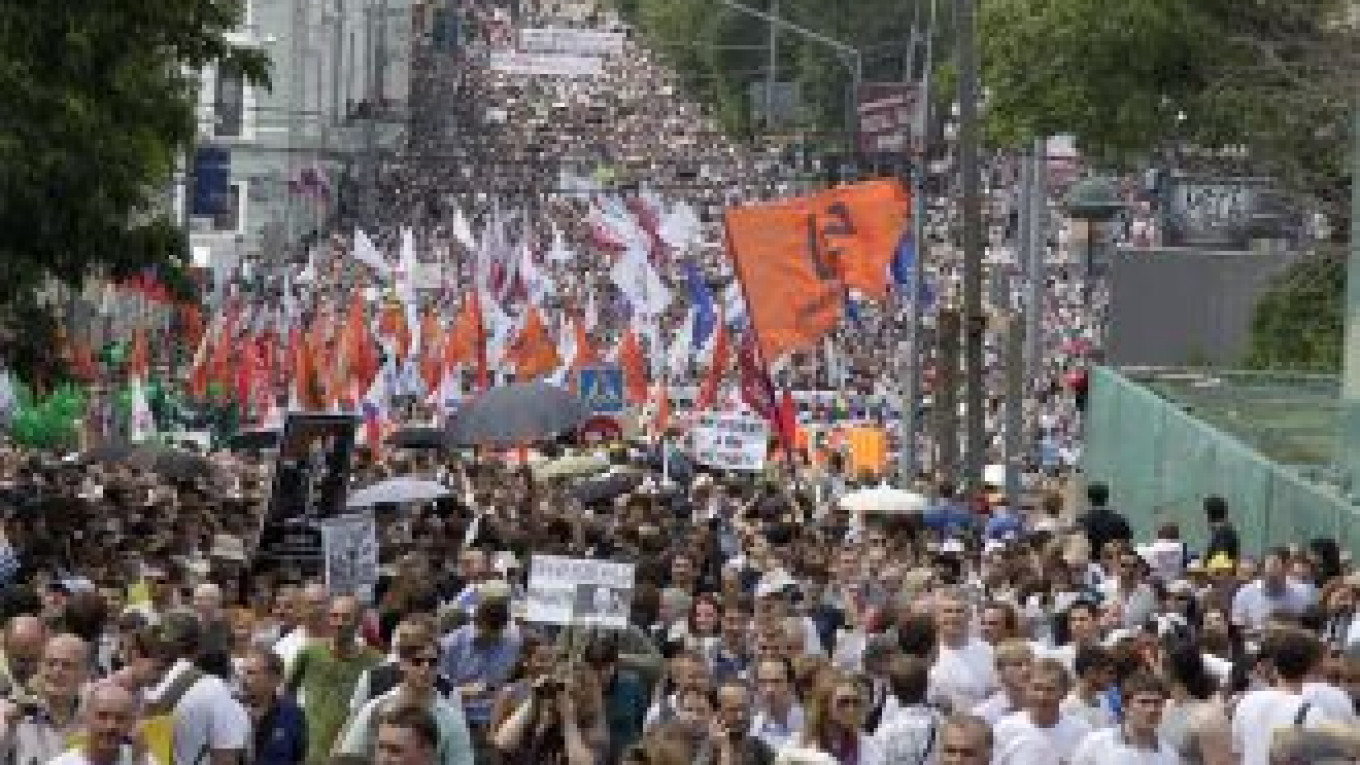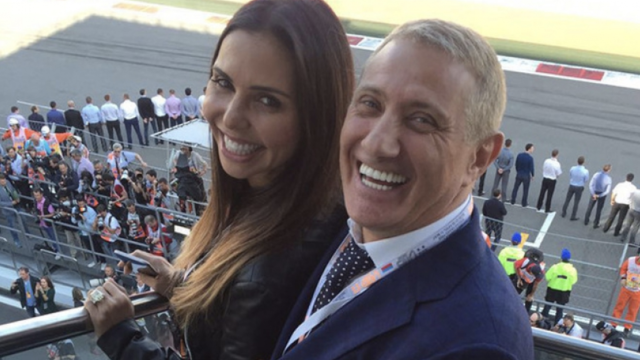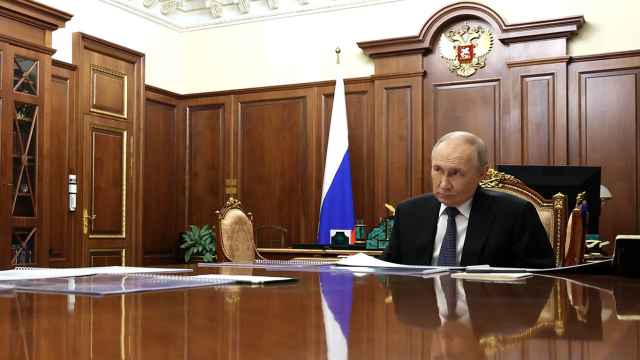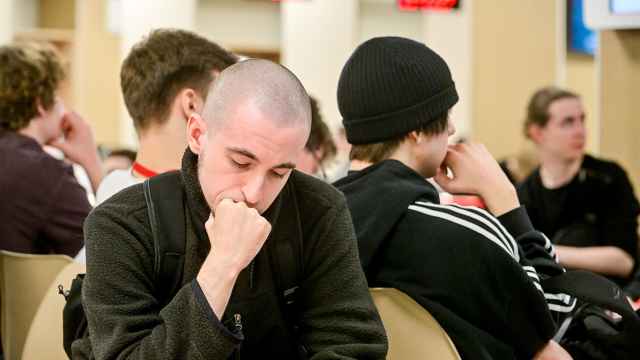When Russians marched through the streets of Moscow on June 12, they walked under old and new party banners — from Communist red to the white and blue of the newly created December 5th Party.
It was just another sign that Russia is seeing a flowering of political parties, as it did in the 1990s, when the collapse of single-party rule opened the floodgates to conservatives, socialists, liberals and nationalists, as well as the eccentric and the frivolous, such as the Beer Lovers' Party.
Yet analysts warn that many of today's newly registered parties are not opposition forces but spoilers and clones that will hinder rather than help the development of multiparty politics.
"There will be 100 parties, but each one will be 2 centimeters tall," said Dmitry Oreshkin, a political analyst who argues that the government hoped to dilute opposition with a huge number of parties.
Though not yet 100, as many as 30 parties may be on ballots for regional and mayoral elections in October, Central Elections Commission head Vladimir Churov said earlier this month.
The Justice Ministry has registered 21 new parties, and more could follow before next week's July 1 deadline.
One of the most striking is the Russian All-National Union, a nationalist party that wants to tie Russia, Belarus and Ukraine into a government called the Russian Union.
The party's literature drips with nostalgia for the "centuries of tradition" of the Russian Orthodox Church.
Also on the list are two Communist parties, both unrelated to the Communist Party that sits in the State Duma.
There are also two green parties and separate parties for women, the old, the young, city dwellers, country dwellers and some wild cards, such as the Social Networks Party, which wants free Internet access for everyone.
Some of the parties appear new, leaving little trace on the Internet beyond their registration papers on the Justice Ministry website. In other cases, new registrations hide old parties, run by familiar faces.
Sergei Baburin, leader of the Russian All-National Union, sat in the Duma in the 1990s and has led a variety of nationalist parties under different names.
Oleg Mitvol, leader of the newly created Green Alliance, made a name for himself threatening Shell for alleged environmental violations while working at the Federal Inspection Service for Natural Resources Use.
Not on the list is the People's Freedom Party, or Parnas, which recently merged with the Republican Party and is now re-established as a legal political party after a long battle with the Russian authorities.
Also not on the list is metals tycoon Mikhail Prokhorov's Civil Platform, an apolitical outfit that says it wants to work with left and right, government and opposition.
Superficially, these new parties appear to radically expand voters' choices, adding to the ruling United Russia party, A Just Russia, the nationalistic Liberal Democrats, the Communists and the liberal Yabloko party.
The surge in new parties comes from a law passed by former President Dmitry Medvedev in response to mass protests that have regularly brought tens of thousands to the streets of Moscow since December 2011.
The new rules dramatically lower the bar for competing in elections. Parties now only need to garner 500 members, compared with 40,000 in the past.
But multiple parties does not add up to a fully fledged multiparty system.
"We are not talking about a real multiparty system, we are talking about the creation of a large number of spoilers," said Pavel Salin, an analyst at the Center for Current Politics.
The government has created the maximum number of spoiler parties, said Igor Bunin, director of the Center for Political Technologies.
Only the Republican Party-Parnas can be seen as a genuine alternative, Bunin said. The rest are either creations by the president's administration or parties that could easily work with it, such as the Union of City Dwellers.
These spoiler parties are especially prevalent on the right flank in order to offset a potential party led by Alexei Kudrin, the veteran finance minister-turned-government critic, Bunin said.
Gleb Pavlovsky, a former Kremlin insider who leads the Foundation for Effective Politics, also pointed to the emergence of numerous spoiler parties that will "hinder election campaigns" and make it harder for the electorate to orientate themselves.
The "let a thousand flowers bloom" approach has divided those who have battled to establish opposition forces in the chilly climate of the last decade, when the barriers to alternative parties were being raised.
"This law is just a joke on the part of the government because it is absolutely clear that it is done to leave United Russia in power," said Alexandra Astavina, a former spokeswoman for the Russian Ecological Party, a long-established green group that has regained the right to be a party under the new law.
Astavina said the law opens the way to joke parties, citing the Beer Lovers' Party, which appeared in the 1990s.
"I don't want my country, which is famous for [cosmonaut Yury] Gagarin, for its writers and its musicians to be famous for such stupid things," Astavina said.
Parties need resources — money and people — to be a bridge between government and the electorate, Astavina said, recalling how she spent one day a week keeping up with correspondence from the general public. "With 500 members, this is not possible."
Others think that a genuine multiparty system could emerge from such unpromising beginnings.
Of course, many of the new parties will be dwarves that will not be effective players in elections, said Oleg Kozlovsky, a doughty civil rights activist and a member of the Solidarity party.
"But in time we will see the formation of a normal party system," he said.
The small parties ought to assess their electoral chances and band together with others to boost their prospects, Kozlovsky said. This will allow "stronger, more able parties to emerge," although the process may take a long time, he added.
"Under our conditions, [the current law] is better than nothing," said political analyst Oreshkin, who stood for the liberal Union of Right Forces in Duma elections in 2007.
The new registration law could help opposition forces emerge in the regions.
"Small parties don't have a real chance to get votes in federal elections," Oreshkin said. "But in certain cases, in certain regions, if there is a strong regional leader, these parties might get 'not bad' results in the regional elections."
The prospect of a President Vladimir Putin surrounded by lilliputian parties has prompted calls for an opposition superparty.
Irina Khakamada, who challenged Putin for the presidency in 2004, has called on opposition figures ranging from Kudrin, corruption campaigner Alexei Navalny and environmentalist Yevgenia Chirikova to join forces.
Only a united democratic party could beat "the Kremlin spoilers" that are sprouting like mushrooms after rain, Chirikova told Novaya Gazeta. "If this united megaparty took even 15 percent of votes, it would be excellent," she said.
But political analysts are not convinced that spoiler parties will be able to fragment the opposition into tiny pieces. The government's calculation that voters will go for these spoiler parties will prove mistaken, said Salin of the Center for Current Politics.
The electorate is more sophisticated now, especially in big towns, he said.
"They will not go for new brands," he said. "They will go for the parties that are already established, the old opposition parties — the Communists, A Just Russia and to a lesser extent the Liberal Democrats and Yabloko."
Several important factors have changed since the 1990s, said Bunin, who paints a picture of a political system in flux.
Leaders of the old parties, such as Gennady Zyuganov of the Communists and possibly Vladimir Zhirinovsky of the Liberal Democrats, are on their way out, Bunin said.
United Russia is in a "serious crisis," and regional governors will enjoy more freedom to organize their own parties, Bunin said. "This system that has been called authoritarian, very centralized and 'sovereign democratic' is now broken."
A Message from The Moscow Times:
Dear readers,
We are facing unprecedented challenges. Russia's Prosecutor General's Office has designated The Moscow Times as an "undesirable" organization, criminalizing our work and putting our staff at risk of prosecution. This follows our earlier unjust labeling as a "foreign agent."
These actions are direct attempts to silence independent journalism in Russia. The authorities claim our work "discredits the decisions of the Russian leadership." We see things differently: we strive to provide accurate, unbiased reporting on Russia.
We, the journalists of The Moscow Times, refuse to be silenced. But to continue our work, we need your help.
Your support, no matter how small, makes a world of difference. If you can, please support us monthly starting from just $2. It's quick to set up, and every contribution makes a significant impact.
By supporting The Moscow Times, you're defending open, independent journalism in the face of repression. Thank you for standing with us.
Remind me later.






